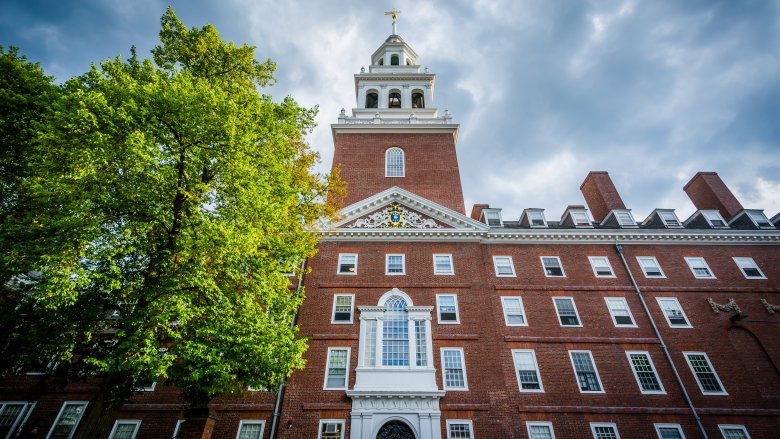What Rich Parents Do To Get Their Kids Into College
If you were one of those kids who turned down social opportunities so you could study, pulled all-nighters cramming for the SAT, graduated with honors, and still failed to get into the school of your dreams, the recent news about rich parents buying their kids spots in top universities probably pissed you off. Heck, it even pissed off people who didn't try that hard to get into college. But it's kind of even more upsetting when you find out there's a long and honored tradition of rich parents buying their kids' way into top colleges, and most of the tactics they use are 100 percent legal.
Yes, it's true, you don't necessarily need a crooked college entrance counselor to get your dumb-as-a-bag-of-rocks son or daughter into Harvard. All you really need is a little bit of know-how. Oh yeah, and also a ton of money.
But don't worry, if you don't have money your kid can still get in through hard work and academic merit, right? Sure. Just as long as there's some room left after all the dumb kids have paid their entrance bribes ... err ... fees. Hey, though, the good news is if you do have paper money oozing out of your pores, here's a complete list of all the things you can do to buy your kid some academic merit.
Bribe college coaches to take your kid based on athletic merit, even if your kid has no actual athletic merit
People have been getting into top colleges on nothing but athletic merit for practically as long as athletic merit has been a thing. But until now, those students have had to have, you know, actual athletic merit. Huh.
One of the illegal tactics uncovered by the FBI after the recent college admissions scam investigation dubbed "Operation Varsity Blues" uncovered evidence that Full House star Lori Loughlin did some shady things to get her kids into college. According to CNN, Loughlin paid $500,000 in bribes to have her kids designated as USC crew team recruits. Never mind that neither of them were ever actually on a crew team because here's $500,000 that says otherwise.
Loughlin wasn't the only parent who paid for this service, which sometimes included digital enhancement work. In other words, people with mad Photoshop skills were hired to basically cut the kids' faces out of photographs and then paste them on stock photos of actual athletes. And then they bribed the coaches at these prestigious universities to look the other way. Weirdly, once they got into the university the kids weren't even expected to participate in the sports they were supposedly so awesome at, which does make a strange sort of sense because we're pretty sure someone on the team would notice that the new star athlete stinks at his or her own sport.
Pay a "college prep" organization to take entrance exams on behalf of your kid
Felicity Huffman, who made herself a tidy little fortune by starring in Desperate Housewives and marrying William H. Macy, was also accused in the Operation Varsity Blues crackdown. Huffman's alleged crimes included felony conspiracy to commit mail fraud and honest services mail fraud. More specifically, the FBI says she paid $15,000 to a fake charity called Key Worldwide, which helped her daughter cheat on the SATs. According to CNN, a "cooperating witness" says he traveled cross-country to administer the SAT test to Huffman's daughter, and then she magically scored 400 points higher than she did on the PSAT she took a year earlier.
Huffman was evidently just following the herd, though. Similar accusations have been leveled at Gregory Abbott, the founder of a food and beverage packaging company. He's accused of spending $50,000 to have someone correct his daughter's ACT exam answers, and another $75,000 to have someone just take the whole dang SAT for her, because really, why even bother going through the motions. And similar accusations have been made against another dozen or so parents, so Key Worldwide seems to have been doing a rather tidy business in fraudulent test-taking. It's all been pretty much foiled, now, though, so if you still want to buy your kid a college placement, you'll have to keep reading for some less illegal but similarly obnoxious ideas.
Donate a bunch of money in exchange for a placement
It's just speculation, but Huffman and Loughlin and the rest of the parents who've been charged in the recent college entrance scandal must have especially academically disinclined children, since they went to extraordinary lengths to get their kids placed at top schools. Other parents have gotten their kids in through perfectly legal (if still sorta shady) means. One method is to just donate a bunch of money to the school and then reap the rewards of the school now feeling like it's beholden to you for your generous gift.
According to Business Insider, the usual MO is to donate a ginormous sum for something substantial, like the construction of a new building. There's some evidence that White House adviser Jared Kushner got into Harvard this way — in 1998, his dad set up a shady meeting with Harvard's president "to discuss ways to donate to the school," and then pledged $2.5 million just before Kushner was admitted.
Okay, so maybe Kushner also had the academic merit to go with his dad's generosity. Not according to his high school, though. "There was no way anybody in the administrative office of the school thought he would on the merits get into Harvard," said one high school administrator. "His GPA did not warrant it, his SAT scores did not warrant it. We thought for sure there was no way this was going to happen. Then, lo and behold, Jared was accepted."
Buy a test prep service to help your kid prepare for the standardized tests
This tactic is less shady, in fact, it's something every parent would probably do given the means. The real problem is that most parents don't have the means, so wealth is still indirectly giving some kids an advantage over others.
It seems like pretty standard stuff — sign your child up for a service like Kaplan Test Prep, which offers live classes both in-person and online for between $799 to $2,599 (if you also want to buy tutoring), and in return your child will be prepared when test day arrives. Seems pretty legit. But if you want your kid to really have an advantage, CNN says you can hire a company like Noodle Pros, which will go beyond ordinary classes with elite one-on-one tutoring services for a mere $200 to $550 an hour.
Now never mind that the average family is going to have a hard time just coming up with the $799 for Kaplan's cheapest option — even those who can afford to pay for that small advantage can't possibly compete with the advantage that comes from $200 to $550 an hour for one-on-one tutoring sessions. So it's legal, but there's no doubt it creates an uneven playing field. Take two kids who have exactly the same ability and ambition, give one of them thousands of dollars' worth of professional tutoring and give the other one nothing, and which one is going to get into the better school? Yep.
Just go all-out and buy four years of college prep service
It's not just those SAT scores that matter, getting into college is about a lot of different variables. So parents with means would do well to just buy a whole package of services, which don't just encompass those final few weeks between high school and college, but sometimes an entire high school career. According to CNN, a modest fee of $15,000 will buy you a college prep package from H&C Education, which will help prepare your kid over the course of an entire year. The service provides guidance in choosing high school classes and developing extracurricular activities, with additional fees for test prep. If you're extra-dedicated, you can enroll your child in the program starting in his or her freshman year, and then every year afterward until that Harvard acceptance letter arrives.
Or, you can give your kid a real advantage and buy the five-year, full-service package from Ivy Coach, which will set you back $1.5 million. Ivy Coach offers college prep beginning in the eighth grade, and will also help your child with test prep and college essays.
"Is that unfair? That the privileged can pay?" Ivy Coach's managing director said in a New York Times interview. "Yes. But that's how the world works." Oh, okay. He seems nice.
Buy a valuable internship from your school's auction site, and then tax-deduct it
Prestigious internships aren't easy to get. First, you need background, skills, ambition, academic worthiness, and the ability to write a stellar essay and cover letter. Then, your application needs to rise to the top, where someone with decision-making power might actually see it. Or you can just have your parents buy an internship for you.
Yes, wealthy parents can do this for their kids, too. According to the Wall Street Journal, there are for-profit agencies out there that will, for a fee, place kids in mostly unpaid internships. Or parents can buy their kids an internship on a charity auction site. They could even pay a marketing firm for a direct-mail campaign. That's right, some parents actually resort to sending out "please hire me" postcards to every prestigious company that might be able to give their kid an advantage.
Charity auction sites are particularly insidious, though, because when you purchase an internship outright you can just skip the whole process of trying to impress a potential employer with trite things like postcards, resumes, cover letters, and essays. Internships are often sold as fundraising efforts for a school, which means you can buy your kid an advantage either before college or during, and it's tax-deductible, too. It's a win-win, except for the poor kids who still have to do it all based on merit. For them it's really more of a win-lose.
Pay for top-notch private schools and maybe even expensive day care
Why wait until the eighth grade when you can start your kid down that money-brick road to success even sooner? Some college prep services start as early as the fourth grade. And some parents will even be thinking about college as they enroll their kid in expensive day cares. So yeah, it's not enough to find a preschool that will help your kid learn how to make macaroni art and play nice with others, now you need to find one that will teach your kid how to take a multiple choice test and write a compelling essay about what brand of paste tastes better.
Private schools are the next step — that will run you around $10,000 a year, which is a bargain compared to dropping a couple million on a building for the college because Junior has an unimpressive academic record. College Transitions says private school counselors spend about 55 percent of their time on college entrance counseling, while for public school counselors that number is more like 22 percent. Some private schools are basically free passes to Ivy League schools, although there is some question as to how much of a leg up other private schools really give you.
Attending an excellent public school can be just as helpful as attending a private school. Not all kids have that opportunity, though, since the school you attend is usually based on where you live and therefore how much money your parents make.
Buy a home in a wealthy neighborhood
So you may not have to send your kid to an elite private school, but there's one thing you can do — you can buy a home in a wealthy neighborhood because wealthy neighborhoods tend to be in the better-performing school districts. Hmm, wonder why that is. It couldn't possibly have anything to do with the fact that more money gives schools more resources to hire better teachers and develop more effective academic programs, which basically equals better educated, more college-ready kids.
The Washington Post says this is one of the simplest and most effective tactics for raising kids who get into great colleges — find out what the best local school district is and make sure your nine-bedroom mansion is solidly located within its boundaries. In fact income segregation appears to be growing fastest among families with children, who are more likely to get into real estate bidding wars for the sake of a great school district. A 2016 study found that childless families tend to live in more economically diverse neighborhoods, but families with kids will often buy into wealthier neighborhoods with better schools.
Those schools might not be a free pass to an elite university — your kids will still have to work hard to set themselves apart from peers — but they won't have to do it at an underfunded school in a poor neighborhood, where concerns about crime and violence are often equal to concerns about test scores.
Buy them an overseas experience
Extracurricular activities always look great on a college application, and we don't mean two-day Fortnite tournaments. The kinds of extracurriculars that (supposedly) get the most attention are the ones that cost money.
While a lot of high school grads have to work at McDonald's just to afford to put gas in their cars, some kids have parents who buy them application-boosting experiences away from home. The Daily Beast says this could be something like a service trip, where a recent grad might work as a volunteer English teacher at an orphanage abroad. This sort of experience will probably cost around $10,000, but at the end of it students will be well-rounded, compassionate people. Although who really cares about that if it also helps them get into an Ivy League school.
Like sending your kid to an expensive prep school, though, there's some doubt that buying expensive "service" trips really does much in the eyes of admissions officers. In some cases, it might even work a little bit against you because it looks an awful lot like trying to buy yourself an impressive application. The tactic tends to work best when it's part of a life-long pattern of service and community involvement, rather than just a one-off, "Hey look at me I taught English to orphans in Ghana." And those experiences do also provide subject matter for stellar college essays, so if they're done intelligently they probably can give a savvy student a leg-up.
Get them in on a "legacy" admission
The fabulous thing about wealth, at least from a wealthy person's perspective, is that it tends to run in families. So if your parents got you a place at Harvard when they donated a bunch of money for a new building or if you got in because they paid someone to take the SAT for you, or heck, even if you got in on your own academic merits because yes, that does actually happen occasionally, you might not even need to do any of these other things to get your own kids into college. Colleges will often admit students at least partly based on the fact that their parents are alumni.
How much does it help to be the child of an alumnus? According to MarketWatch, most schools won't say, probably because they don't want anyone to accuse them of giving certain students an unfair advantage. But according to a 2011 survey conducted by Harvard's student newspaper, about 30 percent of students with a family connection to the university got in. That means that being the son or daughter of a Harvard grad makes you around four times as likely to get into Harvard as the average person who actually worked hard in school and/or got in through donations or bribery. So hooray, you can just skip the line and get a "legacy" admission and then celebrate with a $4,000 bottle of champagne because you can afford it.
Falsify their ethnicities to get them in under affirmative action programs, or just pretend they have disabilities
Okay, so you spent $3 million on college prep packages for your kids and surprise, they're still as dumb as a bag of rocks. What now? Community college? Ordinary state universities, like all the lesser people? No! Now you've got to start being creative. How about this: Lie about their ethnicity and see if you can get them in under an affirmative action program.
As it turns out, the parents involved in the recent college bribery scandal weren't above doing that, either. According to the New York Times, William Singer, the man at the center of the scandal, not only bribed college coaches and test administrators, "he also falsified ethnicities and other biographical details in some cases, to take advantage of affirmative action."
Part of the scheme also involved having kids obtain special exam accommodations based on nonexistent learning disabilities. Under that hack, parents would use fake medical documents to request private testing with a proctor over the course of a couple days. The proctor, of course, would be paid to help the student with the test or correct the answers afterward. So wow. Just wow.











